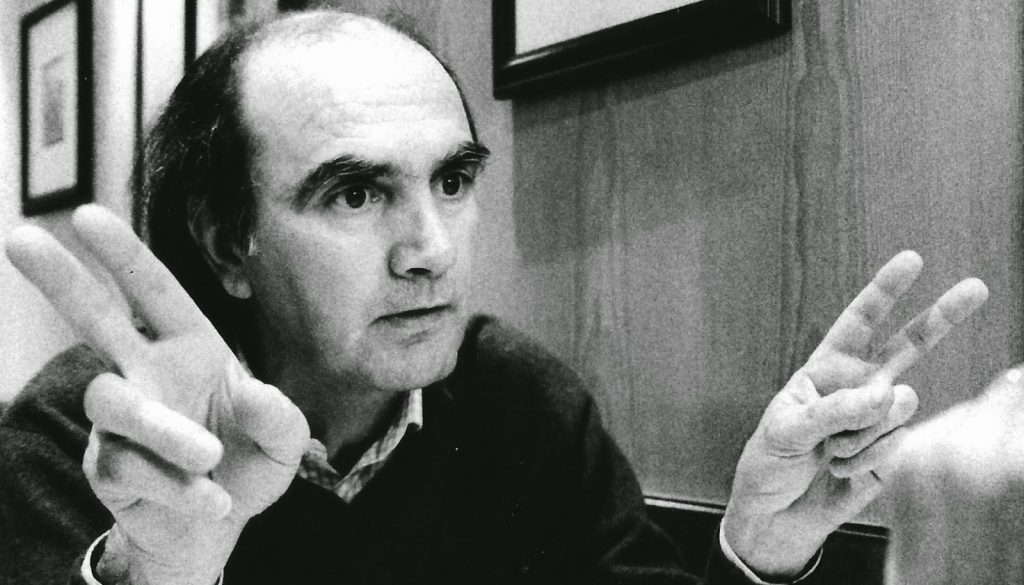Carlos Fausto Bordalo Gomes Dias was born on November 26, 1948, in the middle of the Atlantic Ocean, between Portugal and Angola, aboard a ship. His first 20 years of life are divided between Africa and Europe, but it is in the former Portuguese colony that he spends much of his childhood and adolescence. His musical learning begins with African rhythms that were transmitted to him by a schoolmate in Huambo. Although African culture was a pillar in Fausto’s education, the values of Portuguese culture, especially those of Beira Baixa (where his family is from) were always present in his life.
Musically, Fausto considers himself a faithful heir of musicians such as José Afonso, Adriano Correia de Oliveira or Edmundo Bettencourt, in the work of renewing traditional Portuguese music.
His definitive return to Portugal took place in 1968, coinciding with the beginning of his university studies. In Lisbon, he had his first contact with the ballad movement, initiated by José Afonso, which allowed him to deepen his connection to the traditional roots of Portuguese music.
In 1969, along with an active role in the university associative movement, he edited his first album, called “Fausto”, which earned him the Revelation Prize awarded by Rádio Renascença. Just a year later, he met singers and musicians from the first line of the Portuguese music renewal movement, such as Manuel Freire, Adriano Correia de Oliveira and José Afonso himself, with whom he participated in several shows inside and outside Portugal.
Despite the good grades obtained at the University, he is called, in 1973, to carry out his military service. This forced and unexpected interruption of studies appeared as a reprisal of the current dictatorship to Faust’s political and associative activities. Despite this, the singer refuses to appear at the barracks he had been called to and is therefore considered refractory. Fausto spends the following time in our country in a discreet and clandestine way.
In 1974 (even before 25 de Abril) he continues to prepare the edition of a second album entitled “P’ró Que Der E Vier”, recorded in Madrid. After the 25th of April, a period of great political and cultural activity followed, with thousands of shows all over the country.
Fausto then began a profitable activity as an arranger and producer for other singers. In 1975, in a socially troubled time, he edited his third album of originals with the suggestive title “Um Beco Com Entrada”. Two years later, keeping in mind the preservation of Portuguese identity, he recorded “Madrugada Dos Trapeiros”, where the traces of the new Portuguese Popular Music appear for the first time, in an album that was his first released in Spain.
In 1978, he began work related to the theme of the diaspora and the Discoveries, which would be a recurring subject throughout his career. The fifth album, “Histórias De Viajeiros”, released the following year, includes the theme “Peregrinações”, based on the work of Fernão Mendes Pinto (and which ended up being included in the soundtrack of a play in the Commune). After this edition, Fausto, refers to a first period of silence.
In 1982, he edited “Por Este Rio Acima”, the first album of a trilogy yet to be completed dedicated to the Portuguese diaspora. Three years later, it is the turn of “O Awakening Dos Alquimistas”, which proposes a reflection on the period that followed the 25th of April and on its influence on the transformation of Portuguese mentalities. In 1987, “Para Além Das Cordilheiras” follows, a current reunion of the Portuguese with old Europe. Two years later, he came up with a new work: “A Preto E Branco”, an album that condenses all the songs composed by Fausto, during the time he lived in Angola. It’s your so-called “tropicalist” phase.
From 1989 onwards, he began a second period of voluntary silence, now lasting five years, to work on the composition of “Crónicas Da Terra Ardente”, the second disc of the trilogy on the Portuguese diaspora, which was only released in 1994.
In 1996, he released the compilation album “Atrás Dos Tempos Vêm Tempos”, which included 27 of his songs, now re-recorded, and which reached the Gold Record for sales of over 20,000 units.
After some major concerts, namely one in Belém on July 8, 1997, to celebrate the 500th anniversary of Vasco da Gama’s departure to India at the invitation of the National Commission for Portuguese Discoveries, in 1999 he edited his most recent work: ” Grande É A Viagem”, recording the concerts held that year at the Centro Cultural de Belém.





